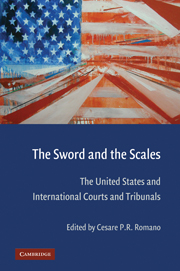Book contents
- Frontmatter
- Contents
- Preface
- Acknowledgments
- Abbreviations
- Contributors
- 1 International Courts and Tribunals and the Rule of Law
- 2 American Public Opinion on International Courts and Tribunals
- 3 Arbitration and Avoidance of War: The Nineteenth-Century American Vision
- 4 The United States and the International Court of Justice: Coping with Antinomies
- 5 The U.S. Supreme Court and the International Court of Justice: What Does “Respectful Consideration” Mean?
- 6 U.S. Attitudes toward International Criminal Courts and Tribunals
- 7 The United States and the Inter-American Court of Human Rights
- 8 From Paradox to Subsidiarity: The United States and Human Rights Treaty Bodies
- 9 The U.S. and International Claims and Compensation Bodies
- 10 Does the United States Support International Tribunals? The Case of the Multilateral Trade System
- 11 The United States and Dispute Settlement under the North American Free Trade Agreement: Ambivalence, Frustration, and Occasional Defiance
- 12 Dispute Settlement under NAFTA Chapter 11: A Response to the Critics in the United States
- 13 The United States and International Courts: Getting the Cost-Benefit Analysis Right
- Index
- References
6 - U.S. Attitudes toward International Criminal Courts and Tribunals
Published online by Cambridge University Press: 05 June 2012
- Frontmatter
- Contents
- Preface
- Acknowledgments
- Abbreviations
- Contributors
- 1 International Courts and Tribunals and the Rule of Law
- 2 American Public Opinion on International Courts and Tribunals
- 3 Arbitration and Avoidance of War: The Nineteenth-Century American Vision
- 4 The United States and the International Court of Justice: Coping with Antinomies
- 5 The U.S. Supreme Court and the International Court of Justice: What Does “Respectful Consideration” Mean?
- 6 U.S. Attitudes toward International Criminal Courts and Tribunals
- 7 The United States and the Inter-American Court of Human Rights
- 8 From Paradox to Subsidiarity: The United States and Human Rights Treaty Bodies
- 9 The U.S. and International Claims and Compensation Bodies
- 10 Does the United States Support International Tribunals? The Case of the Multilateral Trade System
- 11 The United States and Dispute Settlement under the North American Free Trade Agreement: Ambivalence, Frustration, and Occasional Defiance
- 12 Dispute Settlement under NAFTA Chapter 11: A Response to the Critics in the United States
- 13 The United States and International Courts: Getting the Cost-Benefit Analysis Right
- Index
- References
Summary
This chapter aims to provide a description of U.S. policy on the subject of international criminal courts and tribunals, both at present and historically, and how that policy has been, and continues to be, developed. It is not intended to provide a critique of that policy. The merits of policy positions are examined only insofar as they shed light on the origins of or motivations underlying those positions.
As an initial matter, it is essential to formulate a definition of the term “international criminal court” as it is used in this study. The characterization of a court as “international” may be influenced by a range of factors. To comprehend the full range of U.S. policy positions, it is important to include not only those characteristics that jurists would consider relevant but also those that are relevant for policy makers, whether legally relevant or not (and whether reasonable or not).
- Type
- Chapter
- Information
- The Sword and the ScalesThe United States and International Courts and Tribunals, pp. 131 - 184Publisher: Cambridge University PressPrint publication year: 2009
References
- 2
- Cited by

